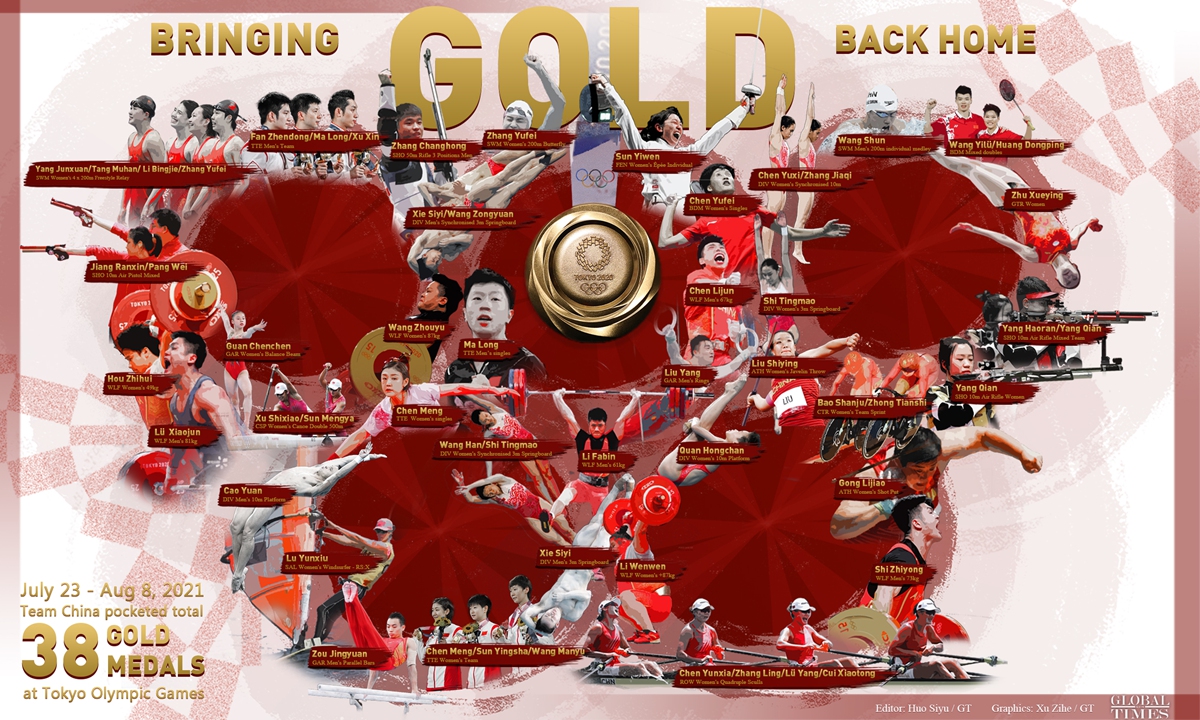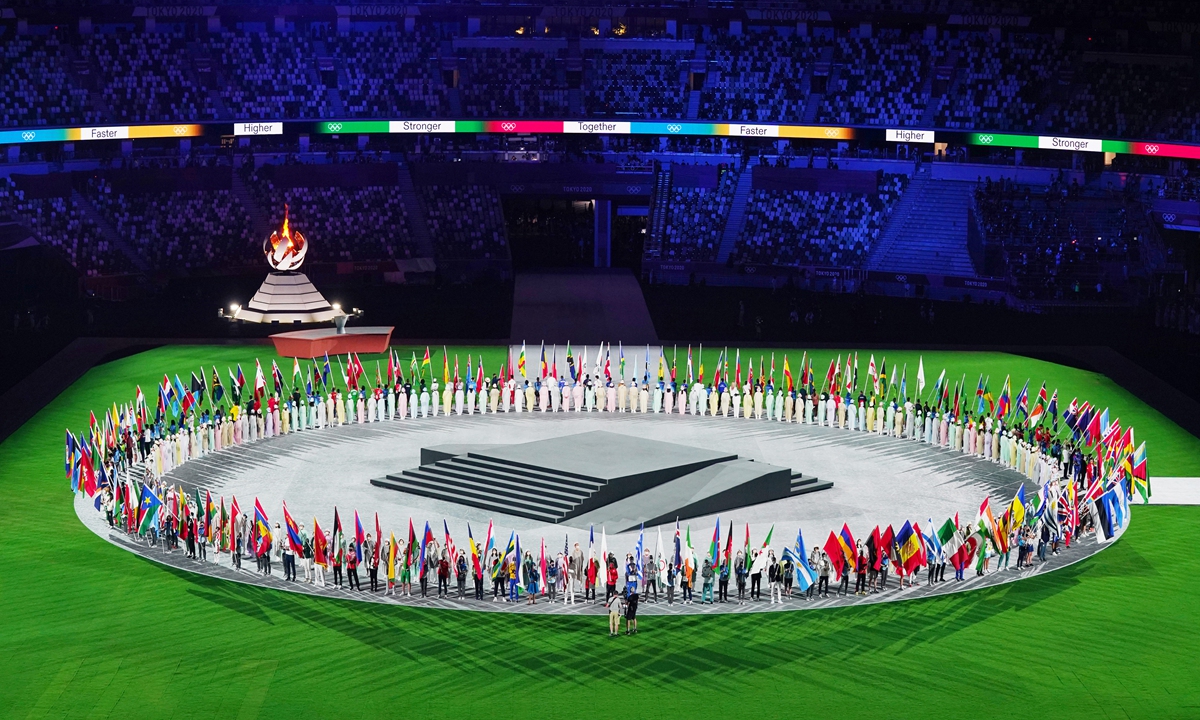
Tokyo Olympics in numbers: Team China ranks second in gold medal tally of the Tokyo Olympic Games. Graphic: Xu Zihe/GT

Flag-bearers of all countries' sports delegations who participated in the Tokyo Olympics 2020 enter the National Stadium in Tokyo, Japan during the closing ceremony of the Games on Sunday. Photo: Xinhua
As worldwide athletes and representatives in obvious joy gathered in the near-empty main stadium for one last time and the Olympic flame was extinguished, the Tokyo Olympic Games, arguably one of the most unusual in the Games' history, came to a conclusion after a spectacular show of the human spirit, sportsmanship, friendship and unity over the past two weeks or so at a time when the world is in desperate need of inspiration and hope.
While the empty seats at the closing ceremony offered a sobering reminder of the challenges posed by the COVID-19 pandemic, the smiling faces of the athletes and officials underscored the success of the Tokyo Games, where many sport stars were born, dreams came true and records were broken.
Above all, the Tokyo Games offered hope and inspiration that the world can still come together to celebrate the human spirit despite all the challenges and hardship, as eyes are now turning to future major international events - the Winter Olympics 2022 in Beijing and Paris 2024 Olympics.
But before that there was plenty to cheer for Team China. The outstanding achievement by Chinese athletes at the Tokyo games has particularly thrilled the Chinese public, boosted their morale and patriotism as the Chinese delegation, with the largest-ever delegation of 777 people sent overseas, bagged a total of 88 medals and ranked 2nd in the medal table, lagging the US by just one gold medal.
Snatching 38 gold medals, Team China have achieved its best result in an overseas Olympics, tying with that at London 2012.
Observers noted that a successfully held Olympics is a desperately needed inspiration to the world right now, for which the athletes and worldwide spectators have the Tokyo Organising Committee of the Olympic Games and the Japanese public to thank.
After a series of performances featuring Japanese culture and characteristics at the closing ceremony, the Olympic flag was lowered down to the hands of Yuriko Koike, governor of Tokyo. Koike gave it to Thomas Bach, president of the International Olympic Committee (IOC), who then passed it on to Paris mayor Anne Hidalgo. Paris will host the Summer Olympics in 2024.
Speaking at the closing ceremony, Bach said "For the first time since the pandemic began, the entire world came together."
"Sport returned to center stage. Billions of people around the globe were united by emotion, sharing moments of joy and inspiration. This gives us hope. This gives us faith in the future."
Addressing the athletes who had assembled in the stadium, he said "You inspired us with this unifying power of sport. This is even more remarkable given the many challenges you had to face because of the pandemic."
Team China showcase dominanceIn China, the Tokyo Olympics has kindled the general public's passion for sports, which is likely to enhance the sporting atmosphere of the whole society. To a depressed world amid the COVID-19 pandemic, the Games brought the spirit of sportsmanship and a ray of light, highlighting global participation and cooperation, experts told the Global Times.
The outstanding performance of the Chinese sports delegation has also sparked great passion and patriotic sentiment in China, and the Chinese public also showed much more mature and reasonable attitude to the Games and the athletes' performance rather than merely focusing on the number of gold medals.
In 16 days, 431 athletes from the Chinese mainland have won 38 gold medals, 32 silver medals and 18 bronze medals, lifting Team China to 2nd place in the medal table.
On Sunday night, the Communist Party of China Central Committee and the State Council sent congratulations to the delegation.
"You have completed your mission to take part in the Olympic Games wonderfully," the congratulatory message read, hailing the athletes sport and moral excellence as well as their great sportsmanship.
Bouncing back from a disappointing Rio 2016, Team China in Tokyo have delivered a strong performance, tying with its best result in an overseas Olympics.
China's traditional dominance in events like diving, weightlifting and table tennis remained strong, harvesting 12, 8 and 7 medals. In many non-dominant events, Team China also made breakthroughs, especially in track and field, where Chinese athletes collected five medals, including two golds. In sprinting, no medals were bagged but a new men's Asian record was set.
China's Generation Z athletes wowed the world with their outstanding performances. Fourteen-year-old Quan Hongchan drew worldwide praise in the 10m platform dive, 21-year-old shooter Yang Qian won China's first gold medal of the Games, and 21-year-old Li Wenwen led the way in the 87kg weightlifting class. Off the field, their stellar performances drew the love of netizens.
China's veterans illustrated the meaning of perseverance. Thirty-two-year-old Su Bingtian, who was also the flag bearer for the Chinese delegation at the closing ceremony, set an Asian record in the 100m sprint, 33-year-old Ma Long became the undisputed GOAT in table tennis history, 37-year-old weightlifter Lü Xiaojun has the respect of fitness people all over the world, and 32-year-old Gong Lijiao won China's first ever Olympic gold medal in field events.
"Due to the epidemic, China has been receiving controversial comments in the world in the past two years. In fact, every one of us athletes is holding our breath, not only to prove ourselves, but also to prove the strength of our country," a Chinese medalist who preferred to stay anonymous told the Global Times.
Nonetheless, beyond medal success, Team China have also done well in epidemic control and anti-doping.
As of Sunday, the last match day of the Games, the delegation had no COVID-19 infections or no close contacts with infected cases. Chinese athletes were tested 226 times for doping as of August 6 and none tested positive, a spokesperson from the Chinese delegation said on Sunday, summing up its Tokyo journey.
Team China fulfilled its goal to play clean and take clean medals at Tokyo, the spokesperson said.
Experts noted that China's firm epidemic prevention work has powered the athletes' outstanding performance by guaranteeing them consistent training and determination.
The anonymous Chinese medalist noted that Chinese athletes abided by stricter prevention standards in Tokyo than obeying those set by the Olympic Committee.
"We wear masks everywhere, even with our own Chinese athletes, and we strictly disinfect ourselves whenever we went out or had our meals," the Chinese athlete said.
Before leaving for Tokyo, the most common wish of the Chinese public for the athletes was not to get infected. Currently, there is one last step to reach this wish.
As of Sunday, 692 members of the Chinese delegation had returned to China, are in the middle of a 21-day quarantine, with isolation sites also available for training.
Ignites passion for sportsFollowing the games around the clock, cheering on the Chinese athletes and discussing their off-field anecdotes - without realizing it, the Chinese public is beaming with pride and their passion for sports has once again been ignited. That is the kind of change a successful international event should bring, observers said.
The Olympics was undoubtedly the hottest topic on the Chinese internet for the entire 16 days of the event. Among the top 50 trending topics on China's Twitter-like platform Sina Weibo, Olympic-related topics often occupied more than half the list. Such a high degree of heat reflects the passion of Chinese people for the Olympics.
"What we love about this Olympics is not just how dominant China's Dream Team are, but the fact that, unlike in the past, there are Chinese players competing almost every day," wrote one netizen on Sina Weibo, "The enthusiasm for the Olympics continued until the last day, and it was a great feeling to cheer for the athletes together with strangers."
Experts pointed out that although the audience could not be present, this year's Olympics received far more attention in China than the previous two Olympics. It also inspired patriotic feelings among Chinese people.
"In the midst of the pessimism that gripped the world amid the COVID-19 pandemic, the Olympics showed the audience the power of unity, and the Chinese audience also improved their understanding of sportsmanship," Zhang Yiwu, a professor of cultural studies at Peking University told the Global Times on Sunday.
The Chinese audience's attention to the Olympic Games goes beyond achievements and nationalities to focus more on the spark of humanity and the Olympic spirit itself.
During this year's Olympic Games, many international athletes were applauded by the Chinese public, including Latvian basketball player Edgars Krumins playing for gold with a broken ankle, Uzbekistan veteran Oksana Chusovitina making her eighth Olympic appearance, Italy's Gianmarco Tamberi and Qatar's Mutaz Barshim sharing the gold medal in the men's high jump, and 12-year-old Syrian Hend Zaza playing for her war-stricken country.
All these moving sporting moments have further germinated the spirit of sports in the hearts of the Chinese, and this is the greatest significance of the Olympic Games, analysts said.
Because the world saw the possibility of a successful event under the pandemic and the power that sport can bring to humanity, it also means expectations are higher for the upcoming Beijing Winter Olympic Games, Zhang noted.
Tokyo inspires the world
Unlike the opening ceremony, in the closing ceremony athletes did not enter in country order, but broke boundaries and entered the venue together, demonstrating unity. Moreover, the impact of the Games on athletes, spectators and the wider world will continue beyond the closing ceremony.
For the athletes, it is the best interpretation of the Olympic spirit to be able to overcome many difficulties to stand on the stage of the highest event again.
"The Tokyo Olympics offered me a new starting point and a platform to showcase my efforts in training and compete with other outstanding athletes to realize my dream," said the Chinese medalist, who beat his personal best in the Olympics, expressing his gratitude to Japan for holding such a grand event.
Much more importantly, the whole world is inspired. The success of the Tokyo Olympics has provided confidence and hope, Da Zhigang, director of the Institute of Northeast Asian Studies at Heilongjiang Provincial Academy of Social Sciences, told the Global Times.
"The Tokyo Olympics showed us the possibility that people can return to normal life co-living with the virus," Da said.
In the midst of an epidemic that has torn governments and public opinion in many countries, the Olympic motto, which just added "together," conveys a spirit of global participation and cooperation, Da said.
About six months after the Tokyo Olympics, the Beijing Winter Olympics will take place.
"The success of the Tokyo Olympics this time around serves as a model for the Beijing Winter Olympics," Zhao Jisheng, a professor with the College of Physical Education and Sports at Beijing Normal University, told the Global Times.
However, some Western politicians are already encouraging various "diplomatic boycotts" of the Beijing Winter Olympics and putting pressure on sponsors, which is political extremism and a major enemy of the Olympics and a major threat to the unity of human society. But the Olympics will always play a positive role, preventing the spread of serious extremism, observers noted.
"We have all reasons to believe in the success of Beijing Winter Olympics because of Beijing's performance in epidemic control, experience in hosting major events and the Chinese people's high spirit," Zhao said.





